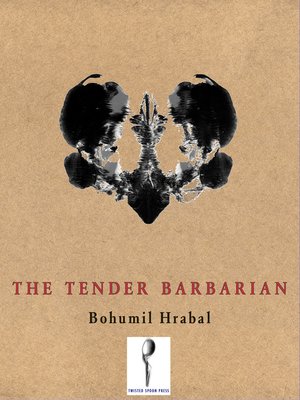
Sign up to save your library
With an OverDrive account, you can save your favorite libraries for at-a-glance information about availability. Find out more about OverDrive accounts.
Find this title in Libby, the library reading app by OverDrive.



Search for a digital library with this title
Title found at these libraries:
| Loading... |
Vladimír Boudník never wanted to live as a successor to
what had already occurred. He preferred instead to play
the imbecile whose only wish was to initiate a new era,
a new epos, a new life brought into being through him.
— Bohumil Hrabal
The Tender Barbarian is a series of texts Hrabal compiled on the one hand to pay homage to his deceased friend, experimental graphic artist Vladimír Boudník, and on the other as a somewhat fictionalized account of their life during the 1950s in Prague–Libeň, with underground poet Egon Bondy acting as Boudník's foil and dialectical antithesis. Having been influenced by Surrealism in the 1940s, by the end of the decade all three were trying to move beyond it: Bondy and Hrabal with Total Realism and Boudník with Explosionalism, an associative method of graphically interpreting random blotches. Boudník here plays the naif, a proletarian artist who's a tender barbarian, someone for whom a state of grace comes naturally, spontaneously, while for Bondy, who is poring over philosophical tomes to learn how to achieve such a state, this becomes a never-ending source of frustration and admiration, to which he reacts with streams of invective. Hrabal once mentioned that when he sat down in 1973 to write something about Boudník for an exhibition and samizdat publication to commemorate the fifth anniversary of his death, he just kept writing and writing, and the book does read almost like an automatic text as one episode spills into another, the interplay between the two protagonists forming a dialectic that Hrabal indicates he has borrowed from Boudník's mode of being and creating.
Whether the book is rightly called a novel, fiction or non-fiction, or both at once, it is a compelling testament to an era and a group of friends who lived for and in art and managed to find beauty and the marvelous even in the dungheap that was Stalinist Czechoslovakia. As Hrabal put it: "I saw two people with the thumbprint of God on their brows: Vladimír and Egon Bondy." This edition is complemented by a selection of Boudník's Explosionalist texts.






